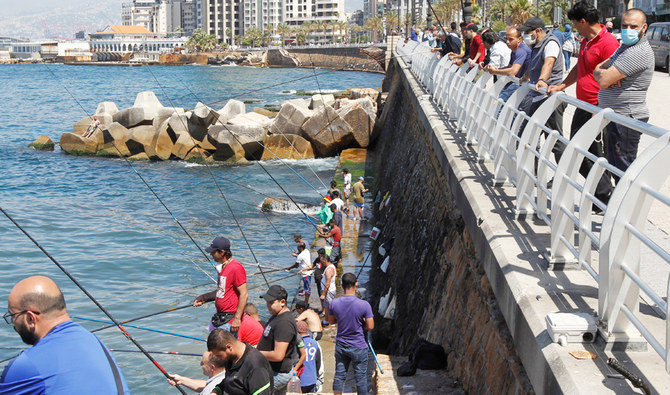
by NAJIA HOUSSARI — arabnews.com — BEIRUT: A Lebanese customs force was attacked by a large group on Monday as they seized two trucks carrying camouflaged tanks filled with about 22,000 liters of diesel, which were heading to a northern border area with Syria. The Lebanese General Directorate of Customs said that the patrol “used the help of the Lebanese Army, which stopped the fleeing two trucks at one its checkpoints in the area, and they were seized in preparation for taking appropriate measures against the smugglers and the group that protected them.” The news of the illegal smuggling operations between Lebanon and Syria has overshadowed news of the economic crises facing Lebanon, especially as the materials being smuggled are diesel and flour, which are precious goods subsidized by the Lebanese state.
A resident of the northern border area with Syria told Arab News: “No one can control the borders that extend hundreds of kilometers in the north and the Bekaa.” He added: “Diesel smuggling operations are not new, but with the collapse of the Syrian pound and the Lebanese pound, subsidized diesel smuggling has become more active. The price of a liter of diesel in Syria is equivalent to LBP 70,000, while the price of a liter of diesel in Lebanon is LBP 10,000. Smuggling this item brings profits to Lebanese and Syrian smugglers.” He pointed out that smuggling operations do not need to transport trucks loaded with diesel to the Syrian territories; a truck only needs to stop on one of the Lebanese highlands at a certain border point before extending its pipes to exchange the diesel between tanks inside Syrian territory. He added that there are also fixed pipes at other border points, especially in the upper Hermel border in the Bekaa.
Customs patrols were active on Monday in the Bekaa to prevent possible smuggling operations from Lebanon to Syria, but truck drivers distributing fuel on the international road between Beirut and Damascus carried out a sit-in on Monday and blocked the vital road in both directions in protest against the stopping of their trucks. The drivers transport fuel and diesel to the Bekaa and Rachaiya areas, which are near Lebanon’s eastern borders with Syria. Hezbollah has the most influence in these areas, especially since it has bases inside Syria on the border with Lebanon, and its vehicles carrying Lebanese license plates move freely within the Syrian territories. A Lebanese customs official told Arab News that truck drivers “were forced to sign pledges not to sell any fuel outside Lebanon.” George Brax, a member of Syndicate of Owners of Petrol Stations in Lebanon, said that smuggled oil “is not available for purchase in the local market.” Brax added that “the value of the smuggled hydrocarbons is over $400 million annually, and this figure may constitute half of the truth.” The Progressive Socialist Party and the parliamentary Democratic Gathering bloc submitted a report to the Public Prosecution about smuggling commodities out of Lebanon, especially subsidized diesel and flour. They called for “opening a judicial investigation and the prosecution and arrest of smugglers and those who cover them.” MP Hadi Abu Al-Hassan said: “We demand the judiciary to close its doors to political interference. We also ask politicians not to interfere to cover the smugglers. We consider the smuggling issue a political issue that should be opened.
Stopping smuggling is the first chapter of the reform that the International Monetary Fund (IMF) demands to address because the continuation of smuggling is draining the state treasury.” This complaint is the second submitted by an opposition party to the government, after a submission by the leader of the Lebanese Forces party, Samir Geagea, last week, which asked the judicial authorities to tackle the smuggling issue “which would save hundreds of millions of dollars for the treasury.” On Monday, Lebanon started its first discussion with the IMF on its economic and financial reform plan via video conference. A source at the Ministry of Finance told Arab News that the first day of discussions was limited to presenting an introduction of the plan. The comprehensive financial recovery plan extends over five years to confront multiple unprecedented economic, financial, monetary and social crises. The leader of the Marada Movement, Suleiman Frangieh — whose party participates in the government — blamed the Free Patriotic Movement, the main partner in the government. Frangieh accused the Free Patriotic Movement of “lying to people in 1989 and you destroyed Lebanon and Christian areas, you lied to people in 2005, and now you lie to people. Your strength was based on popular support, and today your strength comes from authority, but when the authority goes, you will not be worth anything. If the judiciary does not prosecute you, history will judge you.”



